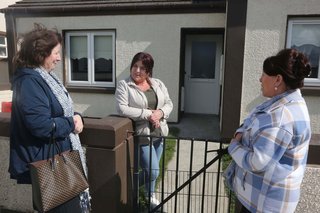
We’ve been working on a project with Pavee Point Traveller and Roma Centre to improve knowledge and awareness about cancer prevention and cancer screening programmes among the Traveller population in north Dublin. It’s part of our work to improve equity in screening and it’s a joint initiative with the National Cancer Control Programme (NCCP).
Mary Brigid Collins, Co-ordinator of the Pavee Point Traveller Primary Health Care Project, talks us through the initiative, what we learned and how we worked together to tell the story of cancer prevention and screening in picture form.
By Mary Brigid Collins
We started the project with the National Screening Service (NSS) in 2022 by looking at bowel screening. In 2023 we moved on to breast screening and then cervical screening.
Why we did the project
Our Traveller community have poorer health outcomes and die younger than the general population. Many Travellers have experienced discrimination and racism in the health service and this makes the health inequalities we experience much worse than the general population.
We know that disadvantaged groups are diagnosed with cancer at a later stage and have worse outcomes, and that cancer screening plays a big role in the early detection of cancer. We wanted to tell the Traveller community about cancer symptoms and the way screening can help prevent cancer, so that they could make a choice about their health.
Targeted information and specific ways to support Travellers is needed to ensure they can engage in mainstream health services such as health screening.
The Primary Healthcare for Travellers Project has been in place since the 1990s. It’s a community development approach where we engage with Travellers in our area to signpost to services and provide support for people to improve their health and wellbeing. We know that 80% of Travellers receive their health information through projects such as ours.
Our Traveller Primary Healthcare Workers (PHCWs) worked to find out what barriers exist to the uptake of screening services among our community. By working in partnership with the NSS and the NCCP we sought to break down barriers and provide access to screening services for Travellers who want to take part in screening.
How we did the project
The Traveller PHCWs delivered peer education and community outreach to Traveller communities in Finglas and Blanchardstown.
- Education: Our PHCWs co-designed education sessions with the NSS and NCCP. We adapted existing resources to make them culturally appropriate for our community. We delivered the education sessions through visuals, easy-read resources, role-playing and storytelling.
- Fieldwork: Our PHCWs carried out fieldwork in their communities. They provided support, information and resources to people about how to prevent cancer, about screening, and about how cancer can be found earlier through screening.
- Evaluation: We held focus groups with PHCWs to find out how they delivered the information, what barriers they came across, and their confidence in the information.
- Screening registration and attendance: we worked with the screening programmes to support Travellers to register and to make appointments when they needed help. The screening programmes organised screening for anyone eligible who wanted to take part.
What we have learned
The PHCWs played an important role giving health information, determining barriers and encouraging people to go for screening. Using our database we have built with the Traveller community we identified people within each age bracket who were eligible to register in each screening programme. We visited people to gather information that enabled us to promote screening and address the barriers our community faces.
The work on CervicalCheck and BreastCheck in particular, helped address the health inequalities Traveller women experience due to racism and discrimination. The women felt included and respected.
The partnership approach worked well to support interventions and to address barriers Travellers may have in registering to attend for screening. The strong relationships our PHCWs have built over the years ensured the project was accepted by the Travellers in our areas, as they trust us and like to engage with us.
By working in partnership with the NSS, we were able to support the PHCWs to create culturally appropriate information. We used lots of images, videos and easy-read materials which made the information easier to understand. This helped to encourage Traveller men and women to register for screening.
Project results
The PHCWs reported good outreach into communities and use of the information with multiple people. A number of people took part in the bowel, breast and cervical screening programmes as a result of the project. We addressed barriers including literacy issues, postal difficulties and fear of the screening process.
Telling the project story through our eyes
We worked with the NSS and an illustrator to develop pictures, called infographics, to tell the story of the project. The infographics show the process and results of the project and some of the challenges for Travellers, such as getting post.
The pictures were co-designed with the PHCWs who worked with the illustrator to make sure they were culturally appropriate, such as showing the different types of accommodation we live in.
The images are eye-catching and give great recognition to the Traveller men and women involved in the project. Through this visual storytelling we can share this work with others in our community. There is one infographic for each of the screening programmes:
Next steps
We'd like to share this work with other Traveller Primary Health Care Projects in Ireland.
We’re going to display the infographics in the Pavee Point Traveller and Roma Centre to share the information with our community. We’ll use this visual imagery as we continue to support and encourage our Traveller community to take part in the NSS cancer screening programmes.
We’ll follow the same process in 2024 to engage Travellers with retina screening for people with diabetes. We’re working on a detailed project report to document all of our learnings and share them. We’ll publish the report when the final part of the project is completed.